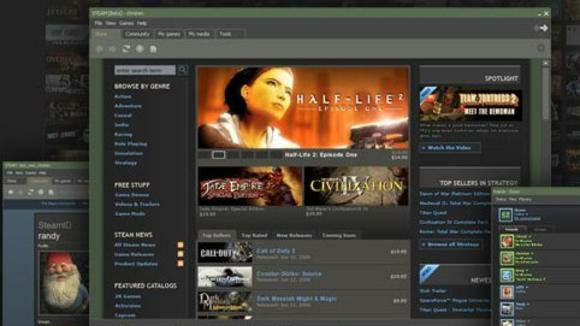
Pardon me for talking about games for a moment, but there's an interesting trend going on that's worth knowing about, and which may surprise you. Specifically, companies are falling over themselves to give their work away for free - and not just the little guys.
Microsoft just released Microsoft Flight, almost every MMO of the last few years whose name doesn't rhyme with 'Urld of Awehaft' has made the transition, and many high-profile titles this year, like Dota 2 and Tribes: Ascend either are, or will be, yours for the cost of a download.
Of course, there's slightly more to it. While these are called 'free to play' games, they all have in-game shops selling variably useful extras. In some cases, it might be 99p for a new hat. In others, it could be holy-hell-in-a-handbasket-level stuff like entire in-game islands for thousands of real-world pounds, or silliness like paying $70 for a monocle. Why? No real reason. And yes, people do buy it.
The weird thing is though that while initially these games tended to be what's called 'pay to win', selling extra power for tasty lucre, they've now evolved beyond that. In most cases, you may have to pay something to unlock a particular character or an in-game skill, but most of the money comes from people buying purely cosmetic upgrades like hats, or silly stuff like keys to open in-game 'lockboxes' containing random loot.
This only works with a large player base, incentivising the developer to be as generous as possible (up to a point, anyway) to keep people around and invite their friends to join in the fun. Work it does though, often tripling a game's profits overnight - and sometimes more.
In retrospect, it's an obvious idea - but aren't they all? The obvious question, however, is whether the same thing might be replicated in a world of serious software and actual work - and not by offering Word users a choice of hats for their circumflexes.
We almost have it with internet services, which tend to use two models - 'freemium', which combines a free core service with premium features, and 'ohgodletgooglebuyusbeforewerunoutofmoney', which typically combines hope with the crushing inevitability of fate, but remains far too many people's business plan.
Get daily insight, inspiration and deals in your inbox
Sign up for breaking news, reviews, opinion, top tech deals, and more.
For regular software though, we're still very much trapped in the old way of working. Where once you'd have bought a box in a shop, now you buy a download. No real difference.
One size doesn't need to fit all
While I won't say Adobe's new Creative Cloud subscription model is a breath of fresh air as such, I do like what it represents - the much needed understanding that in the digital age, one size doesn't have to fit all any more. In a nutshell, where once you'd have had to pay Adobe over £1,500 for a copy of its Creative Suite, you can now pay £46 a month instead and simply access what you want, when you want, or £16 a month if you only want the mighty Photoshop.
I won't say it's a perfect system - not least because the best prices are reliant on signing up for a year, and as ever we're charged a premium for living in the UK - but it's an interesting move that I expect others will at least try to replicate.
Much like F2P gaming, it's a way of broadening the userbase in the hope that more people will sign up, with the added element that any professional who builds their workflow around Creative Suite is never, ever going to want to slum it with the likes of GIMP again.
Still, you've got to wonder how much better it could work with a little more salami-thinking. Imagine a tool like Photoshop for free with some basic tools and bonus tool packs. If you want to edit photos, it's £5 to unlock Levels, Curves and so on. For sillier stuff, say, £10 for a few hundred Instagram type filters.
There's the obvious risk of nickle-and-diming here - or given Adobe's UK prices, pounds-and-more-poundsing - but there's no reason you couldn't have a Photoshop Complete type package if you just wanted to get everything up front.
For Adobe, which is going to sell billions of copies to designers and artists anyway, it'd be a great way to widen the market - and people are much more likely to unlock something in a tool they use than pirate a different one. For users, it's also a secondary benefit of making it possible to get to grips with the tools and see them in context. Done correctly, going free could be the best thing Adobe ever did.
Of course, 'done correctly' is the tricky bit. If you ever see Microsoft Word offering 'Vowels!' as an in-app purchase, you'll know things have gone too far. While it's good to see Adobe stretching itself a bit, it's probably not the company to make the big shift. Someone almost certainly will though, and where one leads, others will follow.
Maybe this won't be the last generation where we expect to buy our software as a matter of course… but it could well be the penultimate one. If so, I think we all know the greatest victims of a free-to-use world - what will all those pirates do with all their new free time?